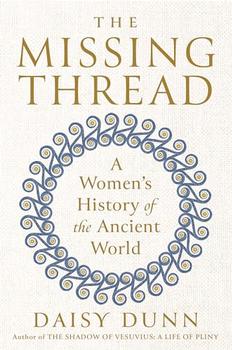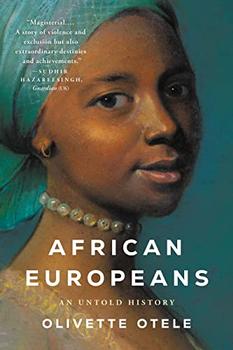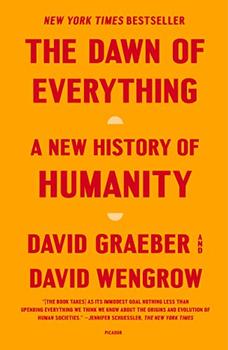Summary | Excerpt | Reviews | Beyond the book | Read-Alikes | Genres & Themes | Author Bio

A Women's History of the Ancient World
by Daisy DunnThe fabric of ancient history is stitched heavily with stories of dramatic politics, conquest, and war, all with men firmly at the center of action. But women played just as vital and central a role in antiquity's most consequential events, as classicist Daisy Dunn (The Shadow of Vesuvius) elegantly details in The Missing Thread.
Dunn observes that countless histories of the ancient world are "ineluctably male" and shares her vision of the classical world as one that is not so much about women as "a history of antiquity written through women." Mining a wealth of archaeological and literary sources, Dunn also includes previously undiscovered material to present 3,000 years of ancient history with women doing more than just weaving or baking: many possessed property, ran businesses, oversaw estates, wrote poetry, and even went to war.
Beginning in Minoan Crete and concluding with the collapse of the Roman Julian-Claudian dynasty, Dunn's story is a global one that moves through Greece, Italy, Asia Minor, Macedon, and North Africa, while also staying true to its classicist focus (the worlds of Greece and Rome [see Beyond the Book]). Throughout, Dunn refuses to ignore the intrinsic contribution of women even though the majority of surviving male sources "simply wrote them out."
In ancient Minoa, Dunn claims, women were often more prominent than men, as the society's rich artwork and architecture can attest. The Minoan religion included a cult of "Snake Goddesses" who mastered snakes the same way Minoan Crete men mastered bulls. The quantity of Minoan artworks with women as the central focus has led some historians to suggest Minoan society was matriarchal or matrilineal, and Dunn agrees to the extent that there is no evidence to indicate women were secondary to men in Minoan Crete.
Although Dunn acknowledges men's primacy in the arenas of power, she underscores the myriad ways women influenced the course of history through their actions. During the epic Greco-Persian Wars, Dunn argues, "exceptional women and girls demonstrated both fortitude and ingenuity." She tells the fascinating story of Gorgo, a Spartan princess and future wife of King Leonidas, whose "quick thinking as an early code-breaker" deciphered a cleverly concealed warning on wax tablets about the invasion of Xerxes' Persian forces in 490 BCE that alerted Sparta and other communities to imminent danger. Women also engaged in violence…and ferociously, too.
A case in point was Queen Tomyris of the nomadic Massagetae tribe on the eastern borders of the Caspian Sea. When Tomyris turned down his marriage proposal in 530/29 BCE, Cyrus of Persia invaded her lands and targeted her people. When Tomyris's son, Spargapises, was captured by Cyrus and died by suicide rather than be held hostage, Tomyris sought vengeance. After massacring Cyrus's forces in battle, Tomyris was reported to have filled an animal skin with human blood and deposited Cyrus's head inside, to fulfill her earlier threat that he would have his "glut of blood" for stealing away Spargapises. No mere hidden sidenote of history, Dunn says Roman writers of the period considered it "one of the most memorable deeds ever performed by a woman in ancient history."
From Artemisia, the sole female commander on either side of the Greco-Persian Wars, to the equally fierce women behind Roman senators and emperors, Dunn's range is sweeping yet sharply focused on her subjects' often-overlooked contributions. In a chapter entitled "This One's for Fulvia," Dunn resuscitates the character of Fulvia, Mark Antony's second wife, who not only warned Cicero about a plot to assassinate him (the infamous Catiline Conspiracy) but also organized a war to protect Antony's reputation. The Perusine War of 41-40 BCE was "truly Fulvia's war," Dunn argues, and recent excavations reveal how close Fulvia was to the action. Lead bullets hurled over the city walls by Octavian's besieging forces were inscribed with vulgar messages to Fulvia. Dunn shares Fulvia's troops' response with her own witty riposte: "'I'm aiming for Octavian's bumhole,' read a counter missile, which was of such a size as to make the threat feasible, though extremely unlikely to be fulfilled."
Fulvia was just one among Dunn's broad cast of exceptional women whose "loyalty and fortitude" was disregarded by their male counterparts, "as women's so often were." Dunn ably brings to the fore women's roles in antiquity—whether writing poetry like Sappho, fighting like Tomyris, or acting as "mistresses of guile" in the palace halls—without pandering to ideology or distorting the reality of patriarchy in ancient cultures.
Dunn answers the many male-centric histories of antiquity with this shimmering volume that celebrates women as true "creators of history" instead of passive bystanders. The Missing Thread, with its rich erudition and sprightly narrative, is an engrossing addition to antiquity studies that readers will want on their shelves for years to come.
![]() This review was originally published in The BookBrowse Review in July 2024, and has been updated for the
December 2024 edition.
Click here to go to this issue.
This review was originally published in The BookBrowse Review in July 2024, and has been updated for the
December 2024 edition.
Click here to go to this issue.

If you liked The Missing Thread, try these:

by Olivette Otele
Published 2023
A dazzling history of Africans in Europe, revealing their unacknowledged role in shaping the continent.

by David Graeber, David Wengrow
Published 2023
A dramatically new understanding of human history, challenging our most fundamental assumptions about social evolution―from the development of agriculture and cities to the origins of the state, democracy, and inequality―and revealing new possibilities for human emancipation.
Your guide toexceptional books
BookBrowse seeks out and recommends the best in contemporary fiction and nonfiction—books that not only engage and entertain but also deepen our understanding of ourselves and the world around us.